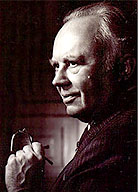The importance of Kirk’s book (as well the remainder of his extensive body of work) should be obvious to those who share the Acton Institute’s Core Principles and possess a passing familiarity with Kirk’s Ten Conservative Principles. For those new to principles espoused by Dr. Kirk, however, a brief and thoroughly incomplete overview of the latter is in order.
The Ten Conservative Principles began as Six Canons listed in the 1953 edition of The Conservative Mind. Kirk subsequently revised what began as his doctoral dissertation to add the poet and essayist T.S. Eliot to the list of preeminent Western conservative thinkers initially begun with Irish statesman Edmund Burke and originally ending with George Santayana. Similarly, he revised the Six Canons to what became a conservative’s Decalogue.
A conflation of Kirk’s principles for the sake of space limitations might read: There exists an enduring moral order; humankind is imperfectable; property rights are imperative for any free society; community is preferable to collectivism; personal passions abjured for prudence; political power restrained; and, finally, the need for reconciling permanence and change. This conflation hardly does justice to Kirk’s thought, but should serve as an entrée for those subsequently seeking the full 10-course intellectual banquet replete with Master Chef, sommelier and full orchestra.
The Ten Principles echo throughout Acton’s Core Principles. For example, Kirk wrote in his first principle that conservatives believe in an enduring moral order. In his 1957 book The American Cause, he explained this principle’s genesis and meaning:
[The] general principles to which most Americans are attached are not themselves—with a very few exceptions—of purely American origin. Our religious and moral convictions had their origin in the experience and thought of the ancient Jews and Greeks and Romans. Our political ideas, for the most part, are derived from Greek and Roman and medieval European and especially English practice and philosophy. Our economic concepts, some of them, can be traced back to the age of Aristotle and beyond; and even the more recent of these economic ideas were first expressed in eighteenth-century Britain and France, rather than in America. American civilization does not stand by itself; it is part of a great chain of culture which we sometimes call “Western civilization,” or “Christian civilization,” yet which in some particulars is older even than the culture of Western Europe or the history of Christianity.
Note similarities between the above and the following from French philosopher Jacques Maritain, written for the introduction of Elements de Philosophie in 1920:
If the philosophy of Aristotle, as revived and enriched by St. Thomas and his school, may rightly be called the Christian philosophy, both because the church is never weary of putting it forward as the only true philosophy and because it harmonizes perfectly with the truths of faith, nevertheless it is proposed here for the reader’s acceptance not because it is Christian, but because it is demonstrably true. This agreement between a philosophic system founded by a pagan and the dogmas of revelation is no doubt an external sign, an extra-philosophic guarantee of its truth; but from its own rational evidence, that it derives its authority as a philosophy.
And this from the Acton’s Core Principles: “Human persons are by nature acting persons. Through human action, the person can actualize his potentiality by freely choosing the moral goods that fulfill his nature.” And again from Acton:
Since persons are by nature social, various human persons develop social institutions. The institutions of civil society, especially the family, are the primary sources of a society’s moral culture. These social institutions are neither created by nor derive their legitimacy from the state. The state must respect their autonomy and provide the support necessary to ensure the free and orderly operation of all social institutions in their respective spheres.
It comes as no surprise Kirk would claim antecedents in Maritain much as he claimed such concepts as the permanent things and moral imagination from historical and contemporary conservatives Burke and Eliot. Neither is it surprising – but no less pleasing – that the Acton Institute ardently continues its work in what one hopes is an imperishable tradition.
